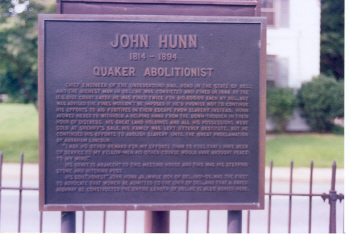G.A.R. - Grand Army of the Republic
Father of Governor John Hunn
Hunn was born June 25, 1818 on Wildcat Manor near Lebanon, Delaware at the mouth of Tidbury branch in Kent County, Delaware. He was the son of Ezekiel Hunn (1774-1821) and the former Hannah Alston. His father was an abolitionist and a member of Religious Society of Friends or Quakers, but died (as did his wife) when this John Hunn was a boy. The young orphan and his siblings were raised by relatives, and his sister later convinced him to become a minister. His half brother Ezekiel Hunn Jr. would be apprenticed to Philadelphia Quaker merchant Townsend Sharpless, whose daughter he would marry and who would later donate some papers to Swarthmore College.
John Hunn married Mary Swallow, who was not a Quaker, and was accordingly expelled from his Camden, Delaware meeting, although the Quakers relented and Mary converted to the faith, so they were allowed to transfer their membership to another meeting near their farm, "Happy Valley," near Middletown, Kent County, Delaware. Their marriage survived until her death, and they had several children, as well as became stalwarts of the Appoquinimink meeting. Among their children was John, later the Governor of Delaware. After Mary's death, John Hunn remarried, to Anne Jenkins.
Abolitionist. Chief Engineer of the Underground Railroad in the state of Delaware during the mid-1800s. Along with Delaware Station Master Thomas Garrett, was responsible for the freedom of thousands of those held in slavery. Was convicted and fined twice for his activities but continued to provide safe haven and escape for slaves on their road to freedom. All of his land and property were later confiscated but he continued on his quest in spite of his family becoming destitute. His son, John Hunn, later served as Delaware's 53rd Governor from 1901 through 1905.
G.A.R. - Grand Army of the Republic
Father of Governor John Hunn
Hunn was born June 25, 1818 on Wildcat Manor near Lebanon, Delaware at the mouth of Tidbury branch in Kent County, Delaware. He was the son of Ezekiel Hunn (1774-1821) and the former Hannah Alston. His father was an abolitionist and a member of Religious Society of Friends or Quakers, but died (as did his wife) when this John Hunn was a boy. The young orphan and his siblings were raised by relatives, and his sister later convinced him to become a minister. His half brother Ezekiel Hunn Jr. would be apprenticed to Philadelphia Quaker merchant Townsend Sharpless, whose daughter he would marry and who would later donate some papers to Swarthmore College.
John Hunn married Mary Swallow, who was not a Quaker, and was accordingly expelled from his Camden, Delaware meeting, although the Quakers relented and Mary converted to the faith, so they were allowed to transfer their membership to another meeting near their farm, "Happy Valley," near Middletown, Kent County, Delaware. Their marriage survived until her death, and they had several children, as well as became stalwarts of the Appoquinimink meeting. Among their children was John, later the Governor of Delaware. After Mary's death, John Hunn remarried, to Anne Jenkins.
Abolitionist. Chief Engineer of the Underground Railroad in the state of Delaware during the mid-1800s. Along with Delaware Station Master Thomas Garrett, was responsible for the freedom of thousands of those held in slavery. Was convicted and fined twice for his activities but continued to provide safe haven and escape for slaves on their road to freedom. All of his land and property were later confiscated but he continued on his quest in spite of his family becoming destitute. His son, John Hunn, later served as Delaware's 53rd Governor from 1901 through 1905.
Family Members
Advertisement
Records on Ancestry
Advertisement




















